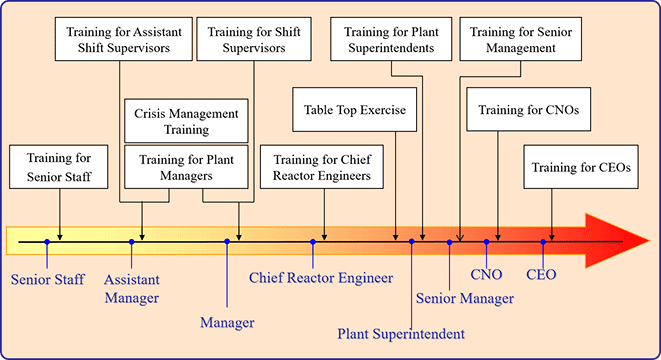


Reflecting on the Fukushima Daiichi accident, JANSI offers leadership trainings for levels spanning from senior managers to top management in the utility. With a focus on qualitative aspects such as responsibility, risk control and organizational operation, the leadership trainings intend to foster leaders who have a good insight into nuclear-specific risks and demonstrate strong leadership.

| Training | Purpose | Summary | Target |
|---|---|---|---|
| Training for CEOs | To share values related to nuclear safety. | Overall discussions with people in the same boat called nuclear power, recalling the lessons learnt from the accident as a CEO, and sharing values related to nuclear safety so that an accident like the one at Fukushima Daiichi accident does not occur again. | CEOs |
| Training for CNOs | To promote a safety culture in the organization and share awareness of the top-level managers of the Nuclear Power Division that protects nuclear safety. | Discussion about the major issues of the nuclear power industry with regard to safety culture, leadership, and responsibilities towards the society, and sharing the awareness of the top-level managers of the Nuclear Power Division. | CNOs |
| Training for Senior Management | To understand role and responsibility demanded to top-level manager of Nuclear Power Division, and share the values against nuclear safety as well as foster the awareness of “we are sailing in the same boat”, while enhancing and boarding quality necessary for them. | To develop qualities demanded to top-level manager of Nuclear Power Division and reaffirm decision as future CNO, through a lecture from people who experienced CNO and who experienced Fukushima Daiichi accident, and exchanging opinion with same top-level manager of utilities. |
Senior Managers (Person of next positon following CNO) |
| Training for Plant Superintendents | To acquire the courage to confront the crisis and to be a leader in the crisis, with respect to nuclear risks, along with re-discovering the preparedness and the requirements demanded from the head of the site. | The issues are picked out from the lectures conducted by the Fukushima Daiichi accident responders, and the crisis management responders of other industries, and by reflecting on the progress of accident and response status. Group discussions and overall discussions are carried out, and the determination and preparedness as the Chief Officer of the plant is reconfirmed. | Plant Superintendents *If plant superintendents cannot attend, proxies may participate instead. |
| Table Top Exercise | To enhance capabilities such as grasping / determining the emergency situation, decision-making and leadership. | Improving the capabilities, such as situational awareness/ determination, decision-making, leadership, required in leaders, representatives, and team leaders of the Emergency Operation Room by being self-driven and by noticing situations, such as how to organize the ever-changing, massive input information, how to operate the organization, and how to attain the mission, through map exercises assuming emergency response. | Leaders, representatives, and team leaders of Emergency Operation Room |
| Training for Chief Reactor Engineers | To enhance the ability to advice as an expert of nuclear safety, and to promote awareness about nuclear safety as a leader. | Promoting awareness as a leader of nuclear safety by perceiving the role to be played as the Chief in the event of emergency and in normal conditions, through lectures and discussions. Moreover, knowledge and understanding required for emergency response are improved through analysis drills, and the ability required of the Chief to advice as an expert of nuclear safety is enhanced. | Chief Reactor Engineers or a representatives |
| Crisis Management Training | To enhance the capability of leadership, strategic instructions, and communication required for problem solving in a critical situation. | The capabilities of strategic instructions and communication required of the team leader of the Emergency Operation Room are enhanced through communication under harsh conditions, situational awareness drills, general supervision drills, actual working drills to accomplish the mission, and discussions after drills. | Leaders of Emergency Operation Room *In principle, department managers and deputy managers who will be serving as Emergency Operation Room team leaders |
| Training for Shift Supervisors | To enhance leadership under high stress. | Soft skills, such as leadership in the event of emergency, required of the Shift Supervisor are enhanced through lectures, group discussions, and role-plays. | Shift Supervisors *In principle, shift supervisors and shift supervisor candidates may attend |
| Training for Assistant Shift Supervisors | To enhance team-building and followership. | Soft skills, such as teamwork, required of the Assistant Shift Supervisor are enhanced through lectures, group discussions, and role-plays. | Assistant Shift Supervisors *In principle, assistant shift supervisors and assistant shift supervisor candidates may attend |
| Training for Plant Managers | To enhance soft skills, such as leadership and communication skills, required of the site managers. | Understanding and developing the strengths of leadership as well as improving the dialog capability required from a leader, through lectures and exercises like role-plays. | Plant manager and plant assistant manager excluding Shift Department etc. |